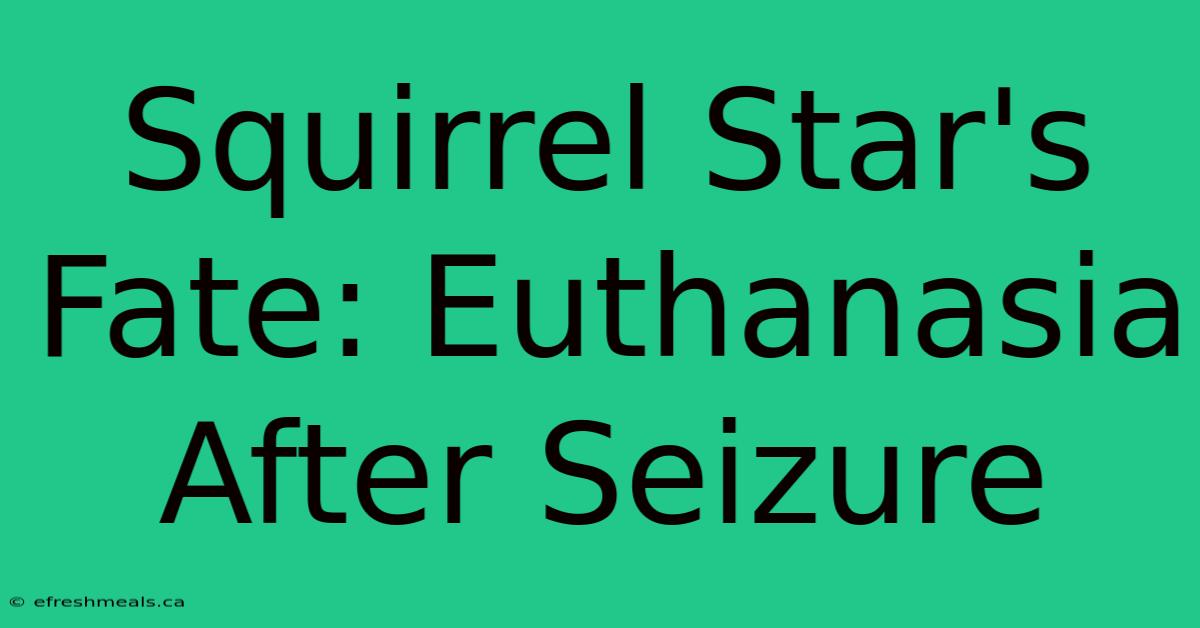Squirrel Star's Fate: Euthanasia After Seizure

Discover more detailed and exciting information on our website. Click the link below to start your adventure: Visit Best Website nimila.me. Don't miss out!
Table of Contents
Squirrel Star's Fate: Euthanasia After Seizure - A Tragic Story of Animal Welfare
Have you ever wondered about the difficult decisions faced by animal shelters and owners regarding euthanasia? The recent case of Squirrel Star, a beloved pet squirrel, has brought this issue to the forefront, sparking debate and raising awareness of the complex realities of animal care.
Why It Matters: Squirrel Star's story highlights the challenges of caring for exotic pets. Squirrels, while captivating creatures, require specialized care and are prone to health issues. This case sheds light on the ethical considerations surrounding euthanasia, particularly when dealing with animals experiencing severe medical conditions.
Key Takeaways of Squirrel Star's Fate:
| Key Takeaway | Description |
|---|---|
| Seizures in Squirrels: | A significant concern, potentially caused by various factors such as malnutrition, infections, or neurological disorders. |
| Euthanasia as a Last Resort: | Considered when suffering is severe and treatment options are limited or ineffective. It is often a compassionate act aimed at alleviating pain and suffering. |
| Animal Welfare vs. Individual Owner's Choice: | The debate revolves around the rights of the owner to decide their pet's fate versus the ethical obligation to prioritize the animal's welfare. |
| Public Awareness of Exotic Pet Care: | This case highlights the need for educating potential owners about the specific needs and challenges associated with exotic pets. |
Squirrel Star's Fate:
Squirrel Star was a beloved pet squirrel who tragically experienced a severe seizure. Despite extensive medical treatment, his condition deteriorated, leaving his owners with the heartbreaking decision to euthanize him.
The Ethical Dilemma of Euthanasia:
Euthanasia, often referred to as "mercy killing," is a complex topic that sparks much debate. In the case of Squirrel Star, his owners faced a difficult choice: continue with potentially ineffective treatment, prolonging his suffering, or end his life to alleviate his pain.
Understanding Euthanasia:
Euthanasia is a medical procedure performed to end an animal's life in a painless and humane manner. It is typically considered when a pet suffers from a debilitating illness, injury, or a terminal condition, where treatment options are limited or ineffective.
Factors that Influence the Decision:
- Severity of the Condition: The extent of suffering and the likelihood of recovery.
- Treatment Options: The effectiveness and availability of treatment.
- Cost of Care: The financial burden associated with medical care.
- Quality of Life: The animal's ability to enjoy its life and engage in normal activities.
- Ethical Considerations: The owner's moral obligation to prioritize the animal's welfare.
The Importance of Owner Education:
Squirrel Star's story serves as a reminder of the responsibility that comes with owning exotic pets. Owning a squirrel, or any exotic animal, requires extensive research and commitment to provide proper care.
- Understanding Specific Needs: Squirrels require a specialized diet, enrichment, and veterinary care.
- Financial Considerations: Veterinary expenses for exotic animals can be significant.
- Legal Regulations: Many areas have regulations regarding exotic pet ownership.
FAQ
Q: Is euthanasia always the right decision? A: Euthanasia is a complex issue with no easy answers. It is a personal decision made by the owner in consultation with a veterinarian.
Q: What are the alternatives to euthanasia? A: Options may include pain management, palliative care, and supportive treatment, but the decision ultimately depends on the individual animal and its condition.
Q: How can I ensure my pet receives the best possible care? A: Consult with a veterinarian experienced in exotic animals, research and understand your pet's specific needs, and be prepared for potential challenges.
Q: What can I do if I encounter an animal in need? A: Contact your local animal shelter or rescue organization for help.
Tips for Responsible Exotic Pet Ownership:
- Thorough Research: Before acquiring an exotic pet, thoroughly research its care requirements, including diet, housing, and veterinary needs.
- Consult with Veterinarians: Find a veterinarian experienced in exotic animals for regular check-ups and specialized care.
- Prepare for Emergencies: Be aware of local emergency veterinary clinics and have a plan for handling unexpected situations.
- Legal Compliance: Understand and follow local regulations regarding exotic pet ownership.
- Enrichment and Socialization: Provide ample opportunities for mental and physical stimulation, and consider socializing your pet with other animals of the same species.
Summary of Squirrel Star's Fate:
The story of Squirrel Star serves as a poignant reminder of the difficult choices that can be faced when dealing with animal health issues. It underscores the importance of careful consideration, responsible ownership, and understanding the complexities of animal welfare.
Closing Message:
Squirrel Star's story emphasizes the need for compassion and responsible decision-making when dealing with animal welfare. It encourages continued dialogue about the ethical considerations surrounding euthanasia and the responsibility of owners to provide the best possible care for their pets, regardless of their species. Let us all strive to ensure the well-being of all animals, recognizing that they deserve humane treatment and compassion.

Thank you for visiting our website wich cover about Squirrel Star's Fate: Euthanasia After Seizure. We hope the information provided has been useful to you. Feel free to contact us if you have any questions or need further assistance. See you next time and dont miss to bookmark.
Featured Posts
-
Canucks Vs Sharks Line Combos On November 2nd
Nov 03, 2024
-
The Rise Of Fashion In Marathon Running
Nov 03, 2024
-
Alberta Premier Smith Wins Leadership Review
Nov 03, 2024
-
Berkshire Hathaway Cash Pile Hits Record 325 2 Billion
Nov 03, 2024
-
Franklins Penn State Struggles In Big Game Loss
Nov 03, 2024
